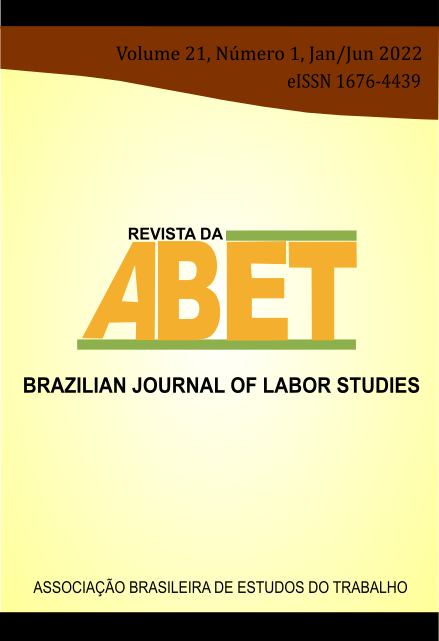THE WILL TO WORK FOR ONESELF AND THE MEANING OF WAGE LABOUR IN RECIFE, BRAZIL
DOI:
https://doi.org/10.61999/abet.1676-4439.2022v21n1.55443Abstract
Prevailingly, positive remarks regarding modalities of work apart from the conventional wage employment have been being purely seen as the triumph of entrepreneurial strategies of co-optation. Let me disagree: in utterances of those, there are some valuable elements to enable a proper investigation of a labour litigiousness. This paper displays some of the results of a study that deals with the stance of the Brazilian working class on wage labour, the fundamental social relation of capitalism. The initial focus was cast on a trivial question about the will to work for oneself, made in the course of a probabilistic, two-stage cluster sampling survey carried out among formal employees in Recife, Pernambuco. In this class experience, the contradictions between negation and consent, between autonomy and heteronomy are assessed in order to clarify the legitimacy of the contemporary capitalist order and the emancipatory aspirations that might take place from within it.
Downloads
Metrics
Downloads
Published
How to Cite
Issue
Section
License
Copyright (c) 2022 Revista da ABET

This work is licensed under a Creative Commons Attribution-NonCommercial-NoDerivatives 4.0 International License.
Política de Acesso Livre
Esta revista oferece acesso livre imediato ao seu conteúdo, seguindo o princípio de que disponibilizar gratuitamente o conhecimento científico ao público proporciona maior democratização mundial do conhecimento.
Atribuição dos artigos é não comercial (sem derivações 4.0, isto é, Creative Commons) e o acesso é livre e gratuito para download e leitura.
Não há taxa para submissão, avaliação e publicação de artigos.
Copyright
1) Os artigos são de responsabilidade exclusiva dos autores. É permitida sua reprodução, total ou parcial desde que seja citada a fonte.
2) Os trabalhos enviados para publicação devem ser inéditos, não sendo permitida sua apresentação simultânea em outro periódico nacional.
3) Os artigos são submetidos a pareceristas "ad hoc", após prévia avaliação da Comissão Editorial, os quais podem aceitar, recusar ou reapresentar o original ao autor com sugestões para alterações. Os nomes dos pareceristas permanecem em sigilo, bem como os nomes dos autores.
Os Autores que publicam nesta revista concordam com os seguintes termos:
Autores mantêm os direitos autorais e concedem à revista o direito de primeira publicação, com o trabalho simultaneamente licenciado sob a Creative Commons Attribution License, permitindo o compartilhamento do trabalho com reconhecimento da autoria do trabalho e publicação inicial nesta revista.
Autores têm autorização para assumir contratos adicionais separadamente, para distribuição não-exclusiva da versão do trabalho publicada nesta revista (ex.: publicar em repositório institucional ou como capítulo de livro), com reconhecimento de autoria e publicação inicial nesta revista.
Autores têm permissão e são estimulados a publicar e distribuir seu trabalho online (ex.: em repositórios institucionais ou na sua página pessoal), já que isso pode gerar alterações produtivas, bem como aumentar o impacto e a citação do trabalho publicado.
Patrocinador
A publicação recebe financiamento da Associação Brasileira de Estudos do Trabalho.










